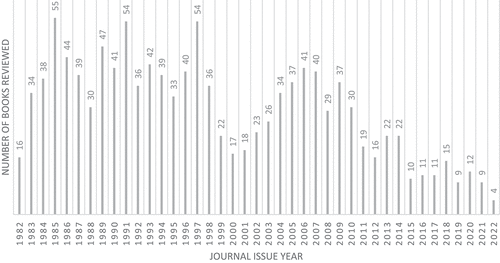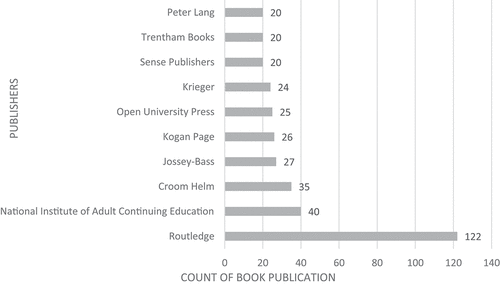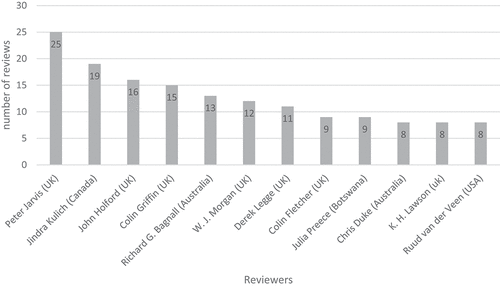The International Journal of Lifelong Education is one of those journals that still invites and publishes book reviews. The journal values books and book reviews, although this stance seems increasingly at odds with the values of contemporary scholarship and commercial publishing. In this editorial, we consider the value of the book form and the book review genre in the light of the journal’s history, extending arguments presented in an earlier editorial, ‘Academic journals and the politics of publication in adult, continuing and lifelong education’ (Milana et al., Citation2016). Among the activities of the editors relating to the journal’s 40th anniversary, data was gathered on its book reviews. Looking back over the four decades of the journal it was striking that the humble book review had been a significant form of scholarship, both quantitatively and in terms of depth of questioning of and speculation on the field. An analysis of book reviews as they appear in successive volumes of the International Journal of Lifelong Education was performed and main results are shared below. The evident decline in the book review as a vehicle for reflection on adult and lifelong learning and education scholarship is also considered and some implications elaborated. We wonder what is lost through the trend away from the book-form that we see in contemporary research and which is reflected in the quantity of book reviews published in the journal over time.
40 years of book reviews
To give an idea of the trend as it is visible in the journal over time, the first volume of the journal contained 23 articles, and 16 book reviews. In contrast, in the 40th year, only four reviews were published over the entire year compared with 32 articles. below shows a count of book reviews year-by-year over the first 40 years of the journal.
A clear downward trend can be observed in this figure, with a striking contrast between the first decade of publication (398 reviews) and the last (125 reviews). The difference between these figures does not take into account the fact that the journal commenced publication with four issues per volume, whereas by the end of the fourth decade, six issues were released each year.
Our consideration of reviews data took into account a few other variables including which publishers were represented and who was writing the reviews. Top publishers of books reviewed over the 40 years are presented in below.
Routledge, an imprint of Taylor & Francis (the publisher of the International Journal of Lifelong Education) dominates this list. Noting that Croom Helm was acquired by Routledge in 1992, the presence of Routledge in the adult and lifelong learning and education field is significant. Although exact details are not known about the relationship between Routledge management and the journal’s book review editors, it is known that Routledge readily imparted quantities of books to the journal in the expectation or hope that reviewers would be found.
Of interest, too, is the identity of reviewers recorded as part of the data collection. names the top 10 reviewers over the 40 years of the journal.
below identifies top reviewers in the most recent decade of the journal. Jarvis and Kulich were no longer active, and some new names appear.
Table 1. Top 10 book reviewers 2012–2022.
Books vs articles
Given the evident decline of the book review as a contribution to the scholarship of the International Journal of Lifelong Education, a question that arises is whether the trend is a result of editorial policy. Well, not as such. Rather, the journal is buffeted by the pressures and values of the commercial journal publishing world and an academy increasingly shaped by ranking regimes. At the same time, publishers – including Taylor & Francis, the publisher of this journal – are less invested than ever in the process of book reviewing. It has become increasingly difficult for the journal’s Book Review Editors to secure the commitment of publishers to release a book for review. It has become difficult to identify individual publisher staff with responsibility for book reviews. Processes for obtaining review titles have also become depersonalised and unreliable, with automated ‘portals’ serving as the conduit requests and no names of relevant publisher staff shared. At the same time, many publishers have moved to an electronic book format and will only provide an e-book for a reviewer to read. However, sometimes those e-books lapse after a period and then are no longer available to the reviewer. One publisher, Springer, compromises by giving a would-be reviewer an e-book for the review process and the option of a complementary physical book upon confirmation of publication of the review. While it is the case that e-books are better environmentally, many reviewers – people who volunteer their time and expertise for the purpose – prefer the embodied experience of book-reading, while of course publishers still print them for paying customers.
The academy is also shifting its attitude to books. Researchers in the field served by the International Journal of Lifelong Education are increasingly subject to pressure to increase the amount and frequency of publications. This trend was observed in an earlier editorial of this journal (Milana et al., Citation2016) devoted to the politics of academic publishing and the move away from books towards articles remarked then has continued. Factors including community, reputation and career stage expectations are shaping publication practices of researchers in the field, while the impact of performance assessment systems based on faculty publishing, journal rankings, and research choices may also be contributing to the rise in the production of journal articles and the reduced emphasis on publishing books and book reviews. The quantum of publications to be achieved this way can outweigh the attractions of the book form. Some publishers abet this trend by publishing book chapters as though they are separate articles, despite the connecting argumentative thread provided by the gestalt of the whole book being broken through the process. Milana et al. (Citation2016) acknowledged the benefits of the article form, including that research findings can be released to the public and academic communities relatively quickly and that a wider range of authors can share their work through journals. There is no denying the value of publishing via articles. The extended dialogue that is this journal is largely a result of the compact treatments of subject matter and to-and-fro debate made possible by the genre.
But is anything lost through any trend away from the book form? In the field of adult and lifelong learning and education, there are numerous examples of books that have made a powerful impact on scholarship and research. For instance, Paolo Freire’s Pedagogy of the Oppressed (Freire, Citation1970) is one of the most-cited books in the pages of this journal (see Torres & Yan, Citation2023 for a review essay celebrating the work of Freire). Across four large chapters and 140 pages, this book unfolds an intricately layered argument about the processes and values of humanisation that draws on Marxian theory and develops both critical and generative positions that give education – appropriately reconstructed – a central place in renewing humanity and its polity. It is difficult to see how the argument could be carried any other way than in the extended form of the book. The individual chapters do not make complete sense by themselves, and the second, third and fourth of them build in a direct way upon the conclusions of the previous one(s). The whole book is required to create the gestalt that is Freire’s contribution. The book’s undeniable influence on the field is surely a function of the depth and scale of argument built up across the chapters. The power of Freire’s argument depends on the book form. The critical argument takes on the complex modern problem of oppression. Here, the extended treatment made possible by the book form allows the intricate problems of power and oppression to be exposed. On the other hand, the note of hope sounded through the book is subtly tied to the critique and requires room to expand in order to move beyond platitude and popular alternatives of religion and hedonism.
In the decades since the publication of Pedagogy of the Oppressed, the problems of oppression and the possibilities of hope have each become more extensive, more subtle, and more urgent. Power is more wily, more sophisticated, more comprehensive. Given that the field of adult and lifelong learning and education retains its orientation to both critique and hope, it is more important than ever to preserve the book form in this context as a vehicle with a scope capable of grappling with the most needful issues. It is thus extremely concerning that academia and publishers are undermining the book form in the pursuit of rankings and shareholder returns. More than ever, we need the book form to shine a strong enough light on the expansive machinery of oppression and show ways beyond it. In contrast, the article form – typically between five and ten thousand words in length – militates against the subtle scholarship demanded by the times. Since each article needs to provide enough context for readers to appreciate the point of the argument, the space for critical and hopeful scholarship is relatively modest. The preference for the article form in academia and among publishers may lead to a situation where researchers eventually face difficulties constructing and sharing complex critiques and generative visions.
The book review
Not only is the book form important for the concerns of adult and lifelong learning and education scholarship, but the book review has been and still is a unique and powerful genre. In a way, the book review is a ‘wild’ type of writing amidst the staid ranks of formal peer-reviewed articles. In the review, the author is free to reveal themself. We learn much about the book in question, but we also divine the interests, learning and even the politics of the reviewer. The genre is thus colourful and at times subversive. It also offers an opportunity for novice scholars to test themselves, but, at least in the International Journal of Lifelong Education, established figures also weigh in from time to time (as can be seen in and above). There is something ever-fresh about the book review. The serious matter of book reviews – giving us a critical insight into new titles – attests as well to the gravity of the book form. Such is the power of the latter that there is a whole tradition of a complementary sort of literature to light the way to our own encounters with books.
This argument about the nature and value of the book review as a form of scholarship is illustrated in Shirley Walters’ review of Elizabeth Lange’s book, Transformative Sustainability Education: Reimagining Our Future, published in the present issue. Walters is a widely recognised lifelong education researcher who has combines activism and critical scholarship to deepen our understanding of the lives and learning challenges of disadvantaged adults and groups. Bringing her extensive learning to bear on Lange’s complex arguments, Walters makes plain the key points and implications of the book. The review is highly accessible, and invites readers to follow her lead by picking up Lange’s book. Through this review, we come to appreciate Walter’s stance as a researcher through her affinity with Lange’s transformative message. It should be noted that Lange’s book itself serves as an example of the argument above about the value of the extended book form as a vehicle for complex analysis and argument to develop critical yet hopeful visions for adult education.
To conclude, although for now our journal provides the means and invitation to submit and publish book reviews, there is a clear decline in support for the review that is not a direct result of editorial policy. We have noted pressures on the book review genre and have sounded alarm over pressures on the book form itself. We hope established and newer scholars of lifelong education will continue to express their more complex insights in the extended format of the book, and that our readers will continue to regard the book review as a worthy genre.
Acknowledgments
The editors thank Dr Emmanuel Abedi for his assistance with the analysis of International Journal of Lifelong Education book reviews.
Disclosure statement
No potential conflict of interest was reported by the author(s).
References
- Freire, P. (1970). Pedagogy of the Oppressed. Seabury Press.
- Milana, M., Hodge, S., Holford, J., Waller, R., & Webb, S. (2016). Academic journals and the politics of publication in adult, continuing and lifelong education. International Journal of Lifelong Education, 35(6), 587–589. https://doi.org/10.1080/02601370.2016.1243380
- Torres, C. A., & Yan, L. (2023). Paulo Freire and the state-of-the-art of the international journal of lifelong education. Invited article in celebration of 40 years of IJLE. International Journal of Lifelong Education, 41(6), 651–665. https://doi.org/10.1080/02601370.2022.2164435



